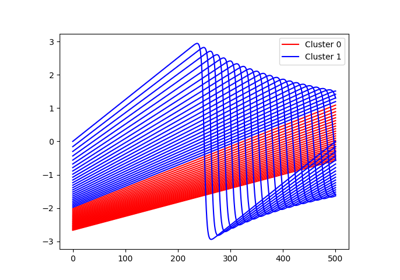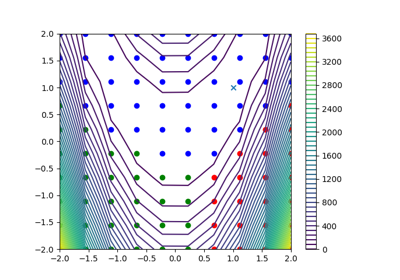moe module¶
Mixture of experts for regression.
The mixture of experts (MoE) model expresses an output variable as the weighted sum of the outputs of local regression models, whose weights depend on the input data.
During the learning stage, the input space is divided into \(K\) clusters by a clustering model, then a classification model is built to map the input space to the cluster space, and finally a regression model \(f_k\) is built for the \(k\)-th cluster.
The classification may be either hard, in which case only one of the weights is equal to one, and the rest equal to zero:
or soft, in which case the weights express the probabilities of belonging to each cluster:
where \(x\) is the input data, \(y\) is the output data, \(K\) is the number of clusters, \((C_k)_{k=1,\cdots,K}\) are the input spaces associated to the clusters, \(I_{C_k}(x)\) is the indicator of class \(k\), \(\mathbb{P}(x \in C_k)\) is the probability that \(x\) belongs to cluster \(k\) and \(f_k(x)\) is the local regression model on cluster \(k\).
- class gemseo.mlearning.regression.moe.MOERegressor(data, transformer=mappingproxy({}), input_names=None, output_names=None, hard=True)[source]¶
Bases:
MLRegressionAlgoMixture of experts regression.
- Parameters:
data (IODataset) – The learning dataset.
transformer (TransformerType) –
The strategies to transform the variables. The values are instances of
Transformerwhile the keys are the names of either the variables or the groups of variables, e.g."inputs"or"outputs"in the case of the regression algorithms. If a group is specified, theTransformerwill be applied to all the variables of this group. IfIDENTITY, do not transform the variables.By default it is set to {}.
input_names (Iterable[str] | None) – The names of the input variables. If
None, consider all the input variables of the learning dataset.output_names (Iterable[str] | None) – The names of the output variables. If
None, consider all the output variables of the learning dataset.hard (bool) –
Whether clustering/classification should be hard or soft.
By default it is set to True.
- Raises:
ValueError – When both the variable and the group it belongs to have a transformer.
- DataFormatters¶
alias of
MOEDataFormatters
- add_classifier_candidate(name, calib_space=None, calib_algo=None, **option_lists)[source]¶
Add a candidate for classification.
- Parameters:
name (str) – The name of a classification algorithm.
calib_space (DesignSpace | None) – The space defining the calibration variables.
calib_algo (dict[str, str | int] | None) – The name and options of the DOE or optimization algorithm, e.g. {“algo”: “fullfact”, “n_samples”: 10}). If
None, do not perform calibration.**option_lists (list[MLAlgoParameterType] | None) – Parameters for the clustering algorithm candidate. Each parameter has to be enclosed within a list. The list may contain different values to try out for the given parameter, or only one.
- Return type:
None
- add_clusterer_candidate(name, calib_space=None, calib_algo=None, **option_lists)[source]¶
Add a candidate for clustering.
- Parameters:
name (str) – The name of a clustering algorithm.
calib_space (DesignSpace | None) – The space defining the calibration variables.
calib_algo (dict[str, str | int] | None) – The name and options of the DOE or optimization algorithm, e.g. {“algo”: “fullfact”, “n_samples”: 10}). If
None, do not perform calibration.**option_lists (list[MLAlgoParameterType] | None) – Parameters for the clustering algorithm candidate. Each parameter has to be enclosed within a list. The list may contain different values to try out for the given parameter, or only one.
- Return type:
None
- add_regressor_candidate(name, calib_space=None, calib_algo=None, **option_lists)[source]¶
Add a candidate for regression.
- Parameters:
name (str) – The name of a regression algorithm.
calib_space (DesignSpace | None) – The space defining the calibration variables.
calib_algo (dict[str, str | int] | None) – The name and options of the DOE or optimization algorithm, e.g. {“algo”: “fullfact”, “n_samples”: 10}). If
None, do not perform calibration.**option_lists (list[MLAlgoParameterType] | None) – Parameters for the clustering algorithm candidate. Each parameter has to be enclosed within a list. The list may contain different values to try out for the given parameter, or only one.
- Return type:
None
- learn(samples=None, fit_transformers=True)¶
Train the machine learning algorithm from the learning dataset.
- load_algo(directory)[source]¶
Load a machine learning algorithm from a directory.
- Parameters:
directory (str | Path) – The path to the directory where the machine learning algorithm is saved.
- Return type:
None
- predict(input_data)¶
Predict output data from input data.
The user can specify these input data either as a NumPy array, e.g.
array([1., 2., 3.])or as a dictionary, e.g.{'a': array([1.]), 'b': array([2., 3.])}.If the numpy arrays are of dimension 2, their i-th rows represent the input data of the i-th sample; while if the numpy arrays are of dimension 1, there is a single sample.
The type of the output data and the dimension of the output arrays will be consistent with the type of the input data and the size of the input arrays.
- predict_class(input_data)[source]¶
Predict classes from input data.
The user can specify these input data either as a NumPy array, e.g.
array([1., 2., 3.])or as a dictionary, e.g.{'a': array([1.]), 'b': array([2., 3.])}.The output data type will be consistent with the input data type.
- predict_jacobian(input_data)¶
Predict the Jacobians of the regression model at input_data.
The user can specify these input data either as a NumPy array, e.g.
array([1., 2., 3.])or as a dictionary, e.g.{'a': array([1.]), 'b': array([2., 3.])}.If the NumPy arrays are of dimension 2, their i-th rows represent the input data of the i-th sample; while if the NumPy arrays are of dimension 1, there is a single sample.
The type of the output data and the dimension of the output arrays will be consistent with the type of the input data and the size of the input arrays.
- Parameters:
input_data (DataType) – The input data.
- Returns:
The predicted Jacobian data.
- Return type:
NoReturn
- predict_local_model(input_data, index)[source]¶
Predict output data from input data.
The user can specify these input data either as a NumPy array, e.g.
array([1., 2., 3.])or as a dictionary, e.g.{'a': array([1.]), 'b': array([2., 3.])}.The output data type will be consistent with the input data type.
- predict_raw(input_data)¶
Predict output data from input data.
- Parameters:
input_data (ndarray) – The input data with shape (n_samples, n_inputs).
- Returns:
The predicted output data with shape (n_samples, n_outputs).
- Return type:
ndarray
- set_classification_measure(measure, **eval_options)[source]¶
Set the quality measure for the classification algorithms.
- Parameters:
measure (MLQualityMeasure) – The quality measure.
**eval_options (EvalOptionType) – The options for the quality measure.
- Return type:
None
- set_classifier(classif_algo, **classif_params)[source]¶
Set the classification algorithm.
- Parameters:
classif_algo (str) – The name of the classification algorithm.
**classif_params (MLAlgoParameterType | None) – The parameters of the classification algorithm.
- Return type:
None
- set_clusterer(cluster_algo, **cluster_params)[source]¶
Set the clustering algorithm.
- Parameters:
cluster_algo (str) – The name of the clustering algorithm.
**cluster_params (MLAlgoParameterType | None) – The parameters of the clustering algorithm.
- Return type:
None
- set_clustering_measure(measure, **eval_options)[source]¶
Set the quality measure for the clustering algorithms.
- Parameters:
measure (MLQualityMeasure) – The quality measure.
**eval_options (EvalOptionType) – The options for the quality measure.
- Return type:
None
- set_regression_measure(measure, **eval_options)[source]¶
Set the quality measure for the regression algorithms.
- Parameters:
measure (MLQualityMeasure) – The quality measure.
**eval_options (EvalOptionType) – The options for the quality measure.
- Return type:
None
- set_regressor(regress_algo, **regress_params)[source]¶
Set the regression algorithm.
- Parameters:
regress_algo (str) – The name of the regression algorithm.
**regress_params (MLAlgoParameterType | None) – The parameters of the regression algorithm.
- Return type:
None
- to_pickle(directory=None, path='.', save_learning_set=False)¶
Save the machine learning algorithm.
- Parameters:
directory (str | None) – The name of the directory to save the algorithm.
path (str | Path) –
The path to parent directory where to create the directory.
By default it is set to “.”.
save_learning_set (bool) –
Whether to save the learning set or get rid of it to lighten the saved files.
By default it is set to False.
- Returns:
The path to the directory where the algorithm is saved.
- Return type:
- DEFAULT_TRANSFORMER: DefaultTransformerType = mappingproxy({'inputs': <gemseo.mlearning.transformers.scaler.min_max_scaler.MinMaxScaler object>, 'outputs': <gemseo.mlearning.transformers.scaler.min_max_scaler.MinMaxScaler object>})¶
The default transformer for the input and output data, if any.
- IDENTITY: Final[DefaultTransformerType] = mappingproxy({})¶
A transformer leaving the input and output variables as they are.
- SHORT_ALGO_NAME: ClassVar[str] = 'MoE'¶
The short name of the machine learning algorithm, often an acronym.
Typically used for composite names, e.g.
f"{algo.SHORT_ALGO_NAME}_{dataset.name}"orf"{algo.SHORT_ALGO_NAME}_{discipline.name}".
- algo: Any¶
The interfaced machine learning algorithm.
- classif_measure: dict[str, str | EvalOptionType]¶
The quality measure for the classification algorithms.
- classif_params: MLAlgoParameterType¶
The parameters of the classification algorithm.
- classifier: MLClassificationAlgo¶
The classification algorithm.
- cluster_measure: dict[str, str | EvalOptionType]¶
The quality measure for the clustering algorithms.
- cluster_params: MLAlgoParameterType¶
The parameters of the clustering algorithm.
- clusterer: MLClusteringAlgo¶
The clustering algorithm.
- property learning_samples_indices: Sequence[int]¶
The indices of the learning samples used for the training.
- regress_measure: dict[str, str | EvalOptionType]¶
The quality measure for the regression algorithms.
- regress_models: list[MLRegressionAlgo]¶
The regression algorithms.
- regress_params: MLAlgoParameterType¶
The parameters of the regression algorithm.
- resampling_results: dict[str, tuple[Resampler, list[MLAlgo], list[ndarray] | ndarray]]¶
The resampler class names bound to the resampling results.
A resampling result is formatted as
(resampler, ml_algos, predictions)whereresampleris aResampler,ml_algosis the list of the associated machine learning algorithms built during the resampling stage andpredictionsare the predictions obtained with the latter.resampling_resultsstores only one resampling result per resampler type (e.g.,"CrossValidation","LeaveOneOut"and"Boostrap").
- transformer: dict[str, Transformer]¶
The strategies to transform the variables, if any.
The values are instances of
Transformerwhile the keys are the names of either the variables or the groups of variables, e.g. “inputs” or “outputs” in the case of the regression algorithms. If a group is specified, theTransformerwill be applied to all the variables of this group.



